It was shown that honey can help sports performance. How about bee pollen? Can bee pollen boost sports performance? Considering that pollen is a form of honey in a more condensed form, sort of saying… Pollen is really powerful stuff, why shouldn’t we take it to boost our energy and increase our immunity while we are pushing the limits of our physical body in our endeavor to perform?
To be honest, I don’t agree with this competitive way of living. I understand it as a source of making money, just like any other job. Otherwise, if one is very good at some sport, for me, it’s like any other person who’s very good at playing the violin, for example. But to be good at sports, a person needs to know how to manipulate his body in order to achieve the desired result.
So, here it is. There have been many studies on what foods are best for performance. Pollen was an intriguing one, as some tests showed a good response while others didn’t.
What have the studies shown?
Can bee pollen boost sports performance?
1. Swimmers.
After taking bee pollen supplementation, there was no positive benefit. BUT, because of the conditions of training, often swimmers get upper respiratory tract infections. Well, the swimmers who took pollen were more resistant and healthy, and they missed only 4 training days after such a respiratory infection, as opposed to the ones taking placebo, who missed 27 days. Conclusion: In a long-term study, this difference in attending more training days could lead to higher performance.
2. Runners.
Long-distance runners have also participated in a study that proved that neither pollen nor protein supplementation helped improve performance or blood hemoglobin values.
3. Light athletic team. Basketball and handball players.
In Lithuania in 1977, there have been a study on a light athletic team. They took 10 g pollen twice a day, and their performance increased, as did the value of hemoglobin in their blood. Analogue-positive experiments were carried out with handball and basketball professional players.
4. Military.
In 1988, in Russia, scientists added 50 g pollen before soldiers’ lunch. Weight, pulse, spirometric value, performance and psychological status, were measured before and after the military training.
The scientists’ conclusion was that pollen can be used successfully in recovery after physical strain periods, also improving the psycho-vegetative condition.
5. Russian sport female students.
Before and after the treatment, the scientists measured the girls’ body weight, performance in holding breath, hanging on the bars, 30 m runs with maximal speed, heart rate, 5 minutes step on a step height of 30 cm, 30 climbs per minute followed by a 5-minute rest.
The girls were given 2 teaspoons of bee pollen (10g) twice a day, for 15 days.
The results showed an increase in the reaction of the body to hypoxia (by 19% – as measured by Stange test) and an improvement in the viso-motoric reaction.
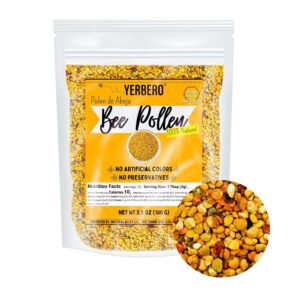
Picture credit: Amazon
So, is bee pollen good for sports performance?
Some studies showed it increased performance; some didn’t. Maybe there were more with positive results. It is also important to know the dosage and the period of time.
BUT
We should not forget that to perform means to push the body’s limits, and that all those increased exercises and overall body stress lead to a decrease in the immune reaction. This translates into an increased infection risk.
Thus, taking bee pollen during training proved to be very beneficial. With high immunity, the body can adjust more quickly to new demands.
In the studies Russians made, the immune reaction measured by reactivity of T-lymphocytes on sportsmen normalized within 8 weeks after an intake of pollen with honey.
How much pollen should be taken?
The performance tests showed that the optimal dosage should be 20-40 g pollen mixed with 50 g honey. The dosage could vary, but as a rule, it must be between 20 and 50 g pollen per day. Read more about how to take it and its impact on human’s health here: Pollen.
My conclusion:
Even if it doesn’t do wonders for increasing the performance of the body, it does do wonders for the body’s immunity system. A healthier person will be more able to train and thus more likely to win.
Related post: Honey Benefits for Athletes
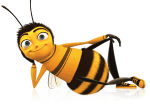
picture source:
imagerymajestic via freedigitalphotos.net;
cartoonwallpapershd.com
info source:
Stefan Bogdanov, Bee Product Science

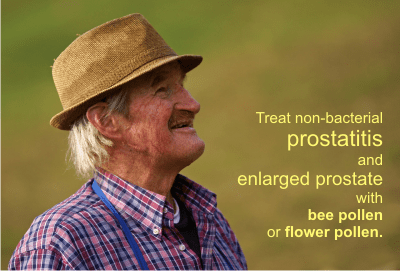
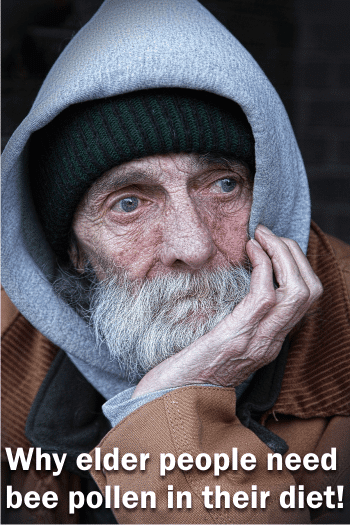
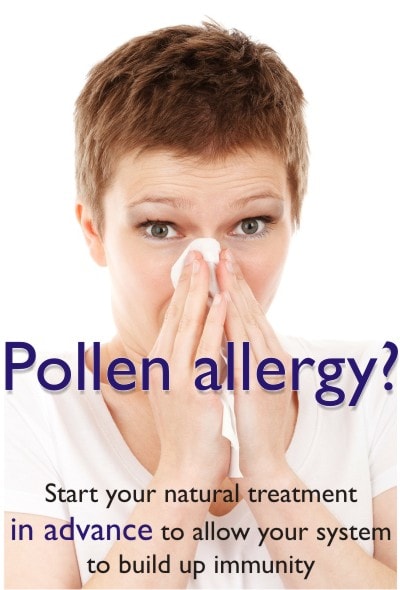
Yes, bee pollen can definitely boost sport performance. I am in the fitness and nutrition industry and Bee pollen has the ability to give you an abundance of vitamins, minerals, enzymes and phytonutrients, which are all important in achieving optimal health. Even Muhammed Ali consumed bee pollen regularly during his career.
Very good info. Thank you for posting it. I love this site!
Thanks, Bart.
What an interesting article thanks for sharing, I think another great take on this article could be raw honey versus conventional/processed honey; I am not sure people are aware the amazing benefits of ingesting raw honey daily for the immune system, one would think that raw honey would help!
Hi Monica.
Yes, raw is better. But raw means only unprocessed. Especially not heated. But this doesn’t mean it comes from an organic field, or that they haven’t used some toxins to kill the pests from the hives, only to give an example.
You can check the page about conventional vs organic and raw vs processed here: https://healthywithhoney.com/organic-honey-vs-regular-honey/
thank you for your visit.
laura